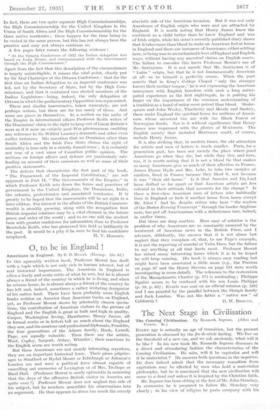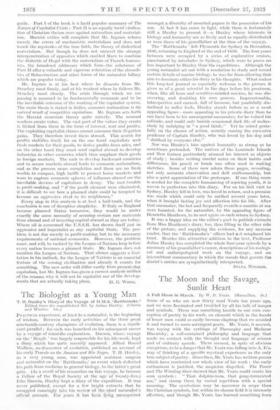The Next Stage in Civilisation
EVERY age is actually an age of transition, but the_ present generation is obsessed by the fin-dc-siècle feeling. We live on the threshold of a new era, and we ask anxiously, what will it be like ? In his new book Mr. Kenneth Ingram discusses in a direct and' stimulating fashion the characteristics of the Coining Civilisation. He asks, will it be capitalist and will it be materialist ? He answers both questions in the negative. He does indeed admit that the necessary transition from capitalism may be effected by men who hold a materialist philosophy, but he is convinced that the new civilisation will come to a dead end unless it is inspired by the Christian faith.
Mr. Ingram has been sitting at the feet of Mr. John Strachey. In economics he is prepared to follow Mr. Strachey very closely ; in his view of religion he parts company with his guide. Part I of the book is a Incid popular summary of The Nat use of Capitalist Crisis : Part II is an equally lucid vindica- tion of Christian theism over, against naturalism and material- ism. Marxist critics- will complain that Mr, , Ingram refutes merely the errors of. mechanistic. materialism and does .not touch the .mysterie: of the true faith, the theory of dialectical materialism. .. But though he does not; unravel the „strange interpenetration of opposites which enabled Marx to combine the dialectic of Hegel with the materialism of French human. ists, the broadcast addresses which form .the substance of Part II offer a valuable and vigorous refutation of the absurdi- ties of Behaviourism and other forms of the naturalist fallacy which arc popular today. .
Mr. Ingram is at his best where he dissents from Mr. Strachey most firmly, and at his weakest where he follows Mr. Strachey most closely. The crisis through which. we arc passing is assumed to be fundamentally economic and to be the inevitable outcome of the working of the capitalist system. The main thesis is stated in italics, economic nationalism is the natural result of competitive capitalism. Mr. Ingram sets forth the Marxist economic theory quite naïvely. The manual workers create value. The vast part of the values they create is filched from them in the form of interest, rent and profits. The exploiting capitalist classes cannot consume their ill-gotten gains. They therefore invest them abroad. This search for profits stultifies itself, for on the one hand capitalists seek fresh markets for their goods, to derive profits from sales, and on the other hand they must send capital abroad to develop industries in other countries .which then supplant their goods in foreign markets. The rush to develop backward .ceentries and to secure markets abroad leads to economic nationalism, and. as the process nears completion and there are no fresh worlds to conquer, high tariffs to protect home markets and Wars to capture economic spheres of influence abroad are the inevitable devices of capitalism in decay. The root-trouble is profit-making, and "if the profit element were eliniinated, it is difficult to see how a planned ,state could be tempted to become an aggressive rival to its neighbours." . • .Every step in this analysis is at best a half-truth, and the conclusion is one of deceptive simplicity. If Italy or England became planned States tomorrow, they would be under exactly the same necessity of securing certain raw materials from abroad and of investing capital abroad as they are today. Where oil is concerned the U.S.S.R. has shown itself just as aggressive and imperialist as any capitalist State. The pro- blem is not due merely to profit-making but to the necessary requirements of national economies. Moreover, the problem must, and will, be tackled by the League of Nations long before every nation becomes a planned State. Mr. Ingram does not mention the League of Nations. That silence suggests a limi- tation in his outlook, for the League of Nations is an essential feature of the coming civilisation and already it counts for something. The new order will differ vastly from present-day. capitalism, but Mr. Ingram has given a correct analysis neither of the reasons why it will not be capitalist nor of the develop- ments that are actually taking place. II. C. Wow:,



































 Previous page
Previous page